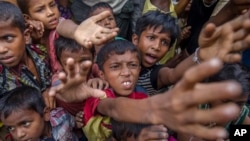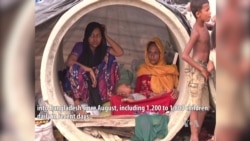Worn down and traumatized, children make up about 60 percent of the Rohingya refugees fleeing what aid groups call ethnic cleansing in Myanmar and heading to difficult conditions and an uncertain future in Bangladesh.
Some 320,000 refugees have crossed over since August, including 1,200 to 1,800 children daily in recent days, the United Nations Children’s Fund said Friday. Bangladesh’s social services department said 13,751 children without a parent or parents were identified in a survey of the crowded refugee camps.
“Many Rohingya refugee children in Bangladesh have witnessed atrocities in Myanmar no child should ever see, and all have suffered tremendous loss,” UNICEF Executive Director Anthony Lake said in a statement.
Violence broke out against Rohingya in Myanmar’s northern Rakhine state following attacks on 30 police posts by Arakan Rohingya Solidarity Army militants Aug. 25. Human Rights Watch said Tuesday that newly released satellite images indicate at least 288 villages were partially or totally destroyed by fire in Rakhine state since then.
WATCH: Traumatized and Needy, Rohingya Children Make Up 60 Percent of Myanmar Refugees
The Asian Human Rights Council released a report Friday saying newly released satellite images reveal that at least 66 were torched since Sept. 5, when security operations there supposedly ended.
Myanmar has said the refugees are welcome to return home, but many fear a repeat of the persecution, rape and killings that they fled.
Rebuilding said to begin
Regional government spokesman Tin Maung Swe told VOA Burmese that security has been restored and rebuilding work has begun in the region.
UNICEF said desperate living conditions and waterborne diseases are threatening the refugees, who have strained Bangladesh’s capability to help them. Many of the newcomers have little to no food and scant shelter. Some have used large concrete culverts to get out of the seasonal rains.
More than 400 schools were closed following the Aug. 25 attacks. Authorities have reopened several of the schools, but most of those in Muslim-dominated areas were not among those reopened, as those villages were destroyed. Refugees have also sought shelter in schools that weren’t razed.
Meanwhile, pressure is mounting on the Myanmar government to do more to ease the crisis.
U.S. officials and lawmakers have been weighing in on possible actions against Myanmar’s military, including possible sanctions and other tough measures, for rights violations.
U.S. Secretary of State Rex Tillerson said this week that Washington holds Myanmar military leaders accountable for rights abuses in Rakhine state. More than 40 congressmen sent a letter to him, urging the administration to take action.






